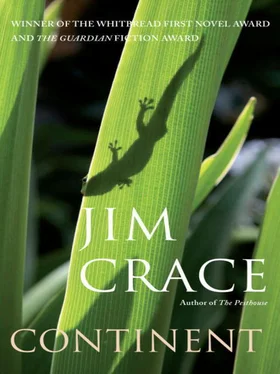The trapper did his best and devised a sentence. ‘Scientist’ he could not translate. But he knew the word for Magician. ‘Body’ became Meat. ‘This man big magician,’ he said, pointing at my father who stood with a fixed smile on his face and his mediocre genitals well hidden by his fieldwork trousers. ‘You give magician meat of one woman, one man, one boy. Dead meat from that house, very quick.’ He pointed at the shelter where the victims of childbirth had been placed. Those few of the men who could understand the trapper’s words shook their heads, not in anger but in puzzlement. The man-who-pincers-testicles is a man-eater, too, they told their comrades. The information seemed to cause hilarity rather than anger. ‘What are they saying?’ asked my father. ‘They think you are a cannibal,’ said the trapper. ‘You want dead bodies — what else could you be?’
‘We packed up for departure speedily then,’ said my mother. The Professor feared that we had outstayed our welcome, that the people would take against us.’ But he and the trapper were conspiring. A cadaver which could not be bought, they reasoned, could be stolen. They could camp a safe distance from the village and then return at night with a donkey and some ropes. Three bodies was too ambitious, clearly. But the body of one of the mothers would provide useful data … and would perhaps not be missed from beneath those damp leaves.
‘They wished to spare my feelings,’ she said. ‘The Professor told me that they would spend the night trapping the bat-moths which were conspicuous in those parts. He and the trapper — did we never learn his name? — went off at dusk with a donkey and a rifle and, I must presume, circled our campsite until they had regained the path to the village. How could I guess their true purpose? I slept, glad to be free of squalling infants and the attentions of the Professor who, even after his erection had been reduced, would nightly sleep against my back as if I were a child’s bolster. We were camped at the edge of the trees and there were few sounds except the snapping of the donkey halters and the occasional owl. I dreamed, too. Something sweet and domestic and kindly, with my sister and our mother brought back from the dead — all of us eating and me singing and that house of wood with its cool flapping screens.’
And then — that cliché — a dry twig snapped in the trees followed by the silence of held breath. It could have been an owl, roosting carelessly on bad wood, or a bell nut splitting and showering its seed. But it woke my mother as sharply as a gun shot. As far as she could see in the darkness, with the moon behind the trees and her eyes still startled by sleep, the donkey, the equipment, the specimen boxes, the dry rations were still where my father had left them. She imagined a thief or villager cutting loose a donkey. Or a scrub dog snouting for food. It seemed safer to leave the tent and crouch by the donkey. She walked the few yards in bare feet, taking with her an iron pot which she could beat on a stone if there were animals to scare off. Then a timid dove took wing as a small voice spoke to her from the darkness and a figure moved out of the trees towards the camp, still talking, ‘Viper-biper-parb…’ ‘Who is it?’ mother said. But she knew. The girl, Puppy, had come.
MY FATHER’S journal is silent on the events of that evening. These are the possibilities. Perhaps by the time he and the trapper reached the village, the dead were already buried. They found the site of recent digging but, as their only equipment was a length of rope, a lantern and a moth net, what could they do? Or, perhaps, the forest people lay in wait. They had expected my father to return. They chased him off. Or my father took fright. Halfway through the trees, startled by a cracking twig as Puppy, maybe, passed them in the dark, he and the trapper lost their taste for body snatching. Or they reached the shelter of the dead and pulling back the leaves they found stench and rankness. The termites and the swag-flies had been at work.
But when my father returned without so much as a single bat-moth, his mood of irritation was soon replaced by a vivaciousness which my mother could not trust or understand. She and Puppy sat cross-legged in the shade like tailors as my father and the trapper concocted their tale of misfortune, of moths evading their net, of opportunities thwarted by undergrowth too thick for the night-time lepidopterist. ‘And why is she here?’ asked father, pointing at the girl. In reply Puppy herself pointed out across the plain towards Etar. ‘She followed me,’ said mother. ‘She wants to come with us. She thinks it’s paradise out there. She wants a dress like mine. It’s all impossible. You’ll have to take her back.’ My father disagreed; he couldn’t go back, he said. He wasn’t welcome. ‘Then what’ll you do?’ asked mother. ‘Leave her here? She’s little more than a child. What is she, twelve, thirteen?’ ‘She can come with us,’ said father. ‘You’ll need some help around the house. You’ve said you like her.’ It was, according to mother, little better than kidnapping, slavery. But father was determined. If they left, the girl would follow, he said. She was like a stray puppy — yes, the nickname had been apposite — which had found a warm home. She wanted to come. She was an adult almost, no matter how tiny her breasts and narrow her hips. She was a free individual. This was her chance to make something of her life. Let her come. Make her welcome.
II
MY MOTHER slept, while my sisters and I, made self-conscious and dutiful by her illness (her madness), aired and tidied the house, polished the cluttered sapwood tables of the reception rooms, threw out old papers, dry plants and bad food. And (as if she was already a corpse) we opened her unanswered mail, checked the contents of the family box which she kept beneath the bed and leafed through the albums of cards and photographs.
‘She’s remarkably strong for a woman in her nineties,’ the doctor said. ‘Her heart and lungs are good, but her mind has gone.’ She was cogent, it seemed, but cantankerous, and meddlesome. That is why we had been summoned. She had thrown soup at the night-nurse. Her ‘things’ went missing, she said, and everybody — the doctor, the neighbours, old friends — had been accused of theft. She spat out her pills. She lived in the past. Which of us, the doctor asked, had room enough and time and patience to offer mother a home. ‘We’re none of us young,’ I said. ‘I’m seventy-two. My heart and lungs aren’t strong, not like mother’s. I smoke. We all smoke.’ The doctor shrugged. He’d done his duty. It was up to us to sort it out.
It was over cigarettes that we discovered a photograph which none of us had seen before. I pulled it from a brittle envelope amongst the monographs and dissertations which our mother had preserved from my father’s archives. A pale triangle cornered the photograph where seventy years of sunlight had blanched the print. Its year was 1914, the year of my own birth. My father, looking older than his thirty-five years in a half-beard, was seated on the veranda at a table — the one that now stood in the corner of mother’s room, heavy with medicines. My mother — a little blurred — was standing at his side, dramatically cutting slices of gourd for the guests and for the camera. We could recognize one or two of the faces, younger versions of the remote professors and their wives who worked with my father at the Institute and who had ignored us when we were children. We recognized crockery, too, and the chairs, and the white heads of the fessandra bushes where then — and still — the cats took their refuge. The ‘kidnapped’ maid who stood in the sunlight at the edge of the veranda, half-turned and smiling like the guests into the camera, was — as mother had described her — tiny, sweet and thirteen. She wore service gloves and a white cotton dress. An empty tray hung by her side. Her feet were bare. Of all the people there she seemed the least self-conscious, attempting to present nothing of herself except the smile. ‘Well, she looked happy enough,’ I said.
Читать дальше












